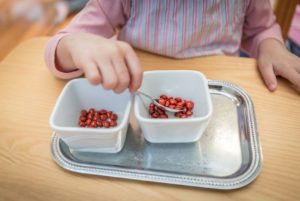By Krista Kerr – Pōhutukawa teacher
For me, one of the best things about teaching (and there are so many) is the reminder tamariki give us numerous times each and every day of the wonder and delight to be taken in ‘small’ things – if we are open to seeing the importance of them!
Wearing the same shirt as a friend, enjoying a book, tying a perfect bow, noticing a rhyming word in their sentence, making someone else laugh, figuring out where a puzzle piece goes, being able to reach the tap for the first time… these are all examples of what we as adults may casually accept as everyday occurrences. However, for tamariki they are all moments of joy; self-made discoveries that add to their experiences and to their character. We have seen a child become completely absorbed in making funny faces for 20 minutes in the mirror they were walking past – and then laughing so hard that their whole body was shaking! Perhaps they had never before realised or explored the different expressions that their face could make, or perhaps they were simply absorbed in enjoying the moment.
Our classes are a hive of activity as tamariki use their hands and minds to explore the world around them; the materials on the shelf as well as the social aspects of being part of a community. Alongside this learning we also place importance on learning outside. Well-being is a term that is being used more widespread these days, with the recognition that holistic well-being (mind, body and spirit) is an area which needs more attention, increasingly for children. Getting outside, exercising our bodies and calming our minds is great for hauora (health and wellbeing), as well as a great place to wonder, make discoveries and explore.
Exploration is a feature of our early childhood curriculum, Te Whāriki. The strand of Exploration/Mana Aotūroa has as its goals:
Children experience an environment where:
- their play is valued as meaningful learning and the importance of spontaneous play is recognised
- they gain confidence in and control of their bodies
- they learn strategies for active exploration, thinking and reasoning
- they develop working theories for making sense of the natural, social, physical and material worlds.
This theme of mana aotūroa is also a feature of Montessori education, and the acknowledgement that exploration thrives on as well as feeds the sense of delight that tamariki so easily find in their days. “We observe that a child occupied with matters that awaken his interest seems to blossom, to expand, evincing undreamed of character traits; his abilities give him great satisfaction, and he smiles with a sweet and joyous smile.” (Maria Montessori, Citizen of the World, p. 96)
So why wait for big events to celebrate when so much is going on all the time – if we only take the time to see and appreciate it!
